James Henley Thornwell Collection (10 vols.)
Digital Logos Edition
Overview
The James Henley Thornwell Collection (10 vols.) contains 4,400 pages of rich history and Southern Presbyterian doctrine. Thornwell was a leading figure in the beginnings of the Southern Presbyterian church and a contemporary of another well-known Southern Presbyterian theologian, Robert Lewis Dabney. His writings and published sermons document the beginnings of the Southern branch of the Presbyterian Church, and they also contain a keen insight into American history before the Civil War up to 1862, when the Civil War was in full force. An excellent collection for historians, theologians, laity, professors, and students, the ten volumes of Thornwell’s writings continue to inspire all who read them.
Professor Eugene Genovese describes Thornwell as wanting “to envision a Christian society that could reconcile, so far as possible in a world haunted by evil, the conflicting claims of a social order with social justice and both with the freedom and dignity of the individual.” These ideas shine through in Thornwell’s writings, which are now more accessible than ever through Logos Bible Software. In electronic format, his writings are easily searchable and easily referenced—his works in Logos make the ideal companion to theological studies.

- Theological writings from one of the 19th century’s leading Southern Presbyterian theologians
- Historic sermons and documentation from the years leading up to the Civil War
- Biographical information on James Henley Thornwell
In the classroom, Thornwell’s pupils regarded him as without an equal. The accuracy of his knowledge, together with its wide range made him, without doubt, the most illuminating instructor of his time in theological and philosophical subjects. His writings upon these themes, moreover, have come down to us to bear witness to the depth of his understanding. As a preacher of the gospel, however, more than in any other respect, Thornwell stood supreme in his own generation.
—Online Reviewer
Thornwell was an early-mid 19th century Southern Presbyterian who might have been the single most influential theologian in organizing the Southern Presbyterian Church.
—Online Reviewer
- Title: James Henley Thornwell Collection (10 vols.)
- Volumes: 10
- Pages: 4,388
- The Collected Writings of James Henley Thornwell, vol. 1
- The Collected Writings of James Henley Thornwell, vol. 2
- The Collected Writings of James Henley Thornwell, vol. 3
- The Collected Writings of James Henley Thornwell, vol. 4
- The Arguments of Romanists from the Infallibility of the Church and the Testimony of the Fathers in Behalf of the Apocrypha
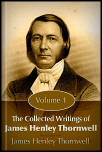
Of The Collected Writings of James Henley Thornwell, volume one is the most theologically involved. This resource contains 16 lectures on subjects relating to God and moral government. Among other essays included are an inaugural discourse, questions on lectures from classes he taught, an analysis of Calvin’s Institutes, and questions from examinations given by Thornwell when he was a professor.
Lectures and Essays Included
- Preliminary Observations
- The Being of God
- Man’s Natural Ignorance of God
- The Nature and Limits of Our Knowledge of God
- The Names of God
- The Nature and Attributes of God
- Spirituality of God
- The Incommunicable Attributes of God
- Creation
- Man
- Moral Government
- The Covenant of Works
- Original Sin
- The State and Nature of Sin
- The Pollution and Guilt of Sin
- Degrees of Guilt
- Theology, Its Proper Method and Central Principle: A Review of Breckinbridge’s Objective Theology
- The Personality of God
- Nature of Our Relation to Adam in His First Sin: A Review of Baird’s Elohim Revealed
- Discourse Delivered by Dr. Thornwell, Upon Being Inaugurated as Professor of Theology
- Questions Upon the Lectures in Theology
- Analysis of Calvin’s Institutes, With Notes and Comments
- Questions on Calvin’s Institutes
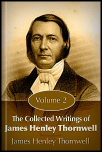
Labeled "Theological and Ethical," this set of fourteen essays discusses a number of doctrinal topics of great significance to the Church. Thornwell contrasts two perspectives on lapsarianism: sublapsarianism and supralapsarianism. Other doctrines touched upon include the priesthood of Christ, election, wisdom for Christian daily living, and the sacrifice of Christ.
Essays Included
- Outline of the Covenant of Grace and Testimony to Sublapsarianism
- Theology as a Life in Individuals and in the Church: Being a Review of Breckinridge’s Subjective Theology
- The Necessity and Nature of Christianity
- Election and Reprobation
- The Necessity of the Atonement
- The Priesthood of Christ
- Christ Tempted as the Second Adam
- The Gospel, God’s Power and Wisdom
- The Personality of the Holy Ghost
- The Nature of Salvation
- Christian Effort
- The Sacrifice of Christ, the Type and Model of Missionary Effort
- Discourses on Truth
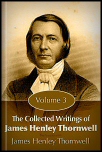
Thornwell’s third volume of collected writings, classified “Theological and Controversial,” is broken into two parts: “Rationalist Controversy” and “Papal Controversy.” These sections address the interactions between philosophy, psychology, and theology, as well as the doctrines of the Catholic church and the Pope. Thornwell’s theological observations on these controversies are compelling and astute.
Essays Included
- Preparatory Note by the Editor
- The Standard and Nature of Religion in Three Sections
- The office of Reason in Regard to Revelation
- Miracles
- Prepatory Note by the Editor
- The Validity of the Baptism of the Church of Rome
- Romanist Arguments for the Apocrypha Discussed (18 Letters)
- Appendix
- Original Article on the Apocrypha by the Author
- Specimen Letters of a Reply by the Rev. P.N. Lynch, D.D.
- Collection of Passages in which Dr. Lynch Represents the Fathers as Quoting the Apocrypha
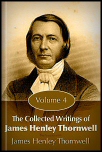
The fourth volume of Thornwell’s collected writings, labeled “Ecclesiastical,” wraps up the set with thoughts on church government, structure, and discipline. Also contained in this resource is historically important documentation regarding Thornwell’s pro-slavery viewpoint, as well as detailed reasoning as to the separation of the Southern Presbyterian Church from the Presbyterian Church.
Sections Included
- Church Officers
- Church Operations
- Church Discipline
- The Church and Slavery
- The Southern Presbyterian Church
- The Church and Secular Societies
- Miscellanea
- Appendixes
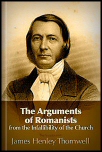
Thornwell, in 1841, published an anonymous short essay refuting the claim that the Apocrypha was of Divine inspiration. In 1842, the essay was republished under Thornwell’s name, which prompted Dr. Lynch, a Roman Catholic priest in South Carolina to then write Thornwell a series of letters, expressing his displeasure and disproof of Thornwell’s claims that the Apocrypha is not in fact Divinely inspired. The Arguments of Romanists from the Infallibility of the Church and the Testimony of the Fathers in Behalf of the Apocrypha is a compilation of nineteen letters of response to Dr. Lynch’s correspondences. Full of theology and historical intrigue, these letters are an excellent resource on the topic.
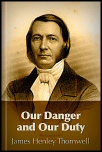
Our Danger and Our Duty is a brief yet compelling address, urging all to be ready to fight and defend the South during the Civil War. A historically significant essay, Thornwell’s writings paint the bleak picture that the Confederates were faced with upon the thought of defeat. His words, meant to inspire and challenge, give a glimpse into the Civil War through the eyes of a Confederate Southern Presbyterian minister.
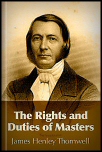
As was Our Danger and Our Duty, The Rights and Duties of Masters is rich with historical importance. A sermon preached on May 26, 1850, Thornwell spoke these words as an inaugural sermon at a church built and dedicated to educate slaves in the area of Christianity and religion. The sermon addresses the text of Colossians 4:1, “Masters, give unto your servants that which is just and equal; knowing that ye also have a master in heaven.”
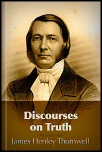
This resource consists of seven sermons preached on the campus of the South Carolina College at the time Thornwell was the chaplain. The sermons were so well-received and useful to their original audience that Thornwell was urged to print them in order that their benefits would become widespread. Topics covered in the sermons include faithfulness, consistency, sincerity, and the love of the truth.
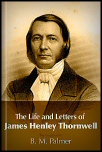
James Henley Thornwell led a fascinating life during a time of great national upheaval in the United States of America. This resource outlines his life, beginning from birth and early childhood and continuing on to his experiences as a minister and professor up until the time of the Civil War. His work assisting with the beginnings of the Southern Presbyterian Church is an important part of both his life and the history of the Church in the 1800s, and is documented in this biographical work. Also included are letters he wrote during his time spent abroad in Europe as well as some general correspondences.
Benjamin Morgan Palmer (1818–1902) was a Southern Presbyterian theologian, orator, writer, and minister.
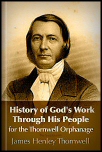
This book details the history of the building and founding of the Thornwell Orphanage. First opening its doors in 1875, the orphanage was founded by William Plumer Jacobs, a Presbyterian minister and theologian in Clinton, SC. The facility was named for Thornwell for his theological inspiration and was founded in the wake of the Civil War. History of God’s Work Through His People for the Thornwell Orphanage is an inspirational story of God’s work through an orphanage that is still around today.
James Henley Thornwell, born in 1812, was a Southern Presbyterian minister from South Carolina. He was a professor both at South Carolina College and Presbyterian Theological Seminary in Columbia, and penned many theological essays throughout his life. A contemporary of Robert Lewis Dabney and Charles Hodge, he founded the Southern Presbyterian Review and was one of the leading figures in the establishment of the Presbyterian Church in the Confederate States of America. Thornwell was highly involved with the current day’s political situation—a vocal proponent of slavery and supporter of the South during the Civil War. He died in 1862 after a long battle with tuberculosis.
Reviews
1 rating

Larry Proffitt (I
11/13/2013